LPU MGN101 Business Organization and Management: Cold Chain Startup
VerifiedAdded on 2022/04/21
|19
|5202
|45
Homework Assignment
AI Summary
This assignment, completed for MGN101 at Lovely Professional University, details a proposed cold chain startup designed to address the significant wastage of perishable products in India. The startup focuses on creating a temperature-controlled supply chain from farm to consumer, encompassing pre-cooling, storage, transportation, and distribution of various perishable goods like fruits, vegetables, dairy, and pharmaceuticals. The document outlines the startup's form of organization as a private company, highlighting its benefits and limitations. It emphasizes the novelty of connecting producers to retailers through an unbroken cold chain system, addressing the need to reduce food waste and improve the efficiency of the existing supply chain. The assignment further identifies the market opportunity, citing the substantial losses in perishable products and the growing demand for cold chain infrastructure. The student also analyzes two relevant MSME schemes that could benefit the startup, and concludes by emphasizing the importance of cold chain industry in meeting the needs of a changing lifestyle and the support provided by the Government of India.
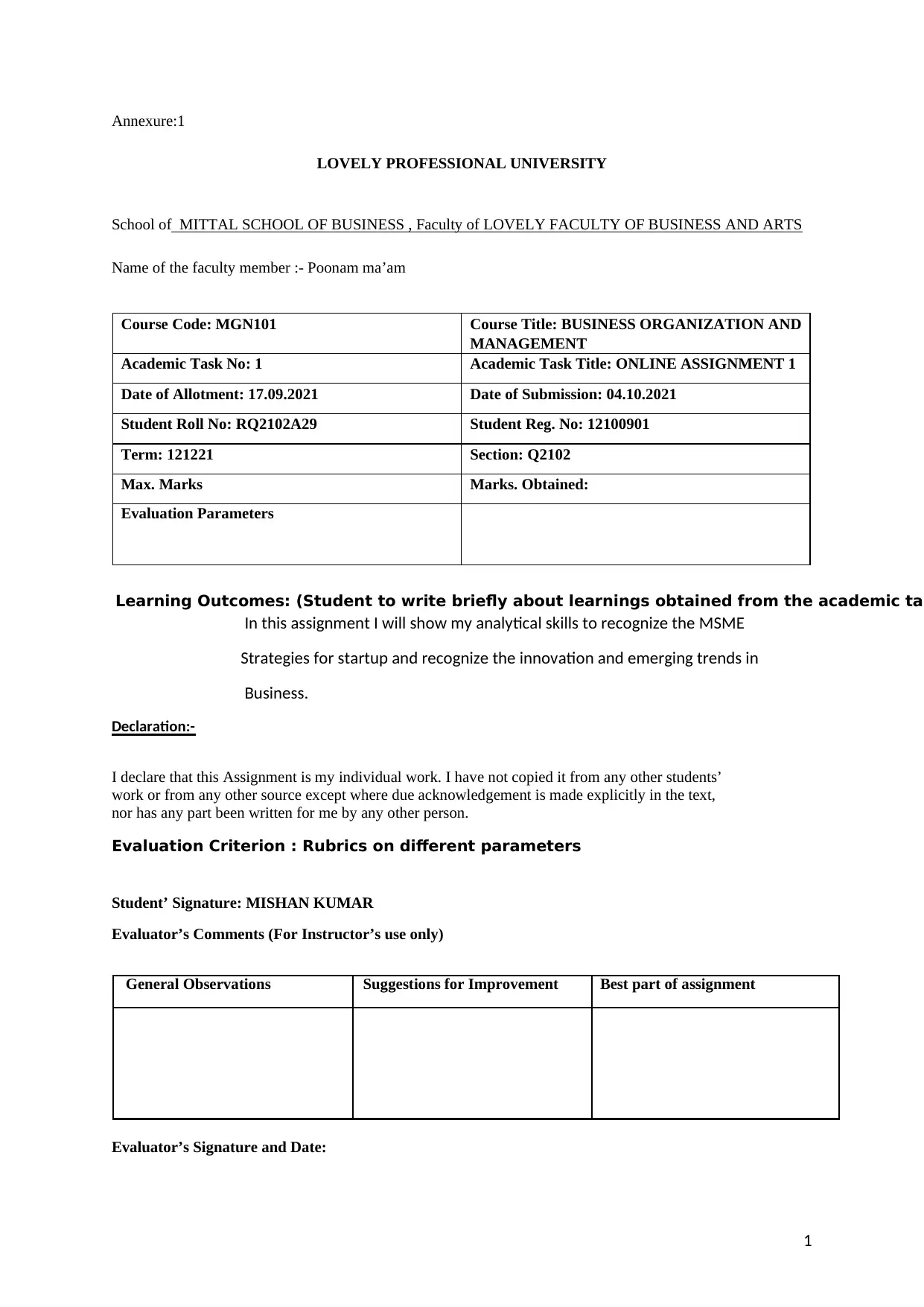
1
Annexure:1
LOVELY PROFESSIONAL UNIVERSITY
School of MITTAL SCHOOL OF BUSINESS , Faculty of LOVELY FACULTY OF BUSINESS AND ARTS
Name of the faculty member :- Poonam ma’am
Course Code: MGN101 Course Title: BUSINESS ORGANIZATION AND
MANAGEMENT
Academic Task No: 1 Academic Task Title: ONLINE ASSIGNMENT 1
Date of Allotment: 17.09.2021 Date of Submission: 04.10.2021
Student Roll No: RQ2102A29 Student Reg. No: 12100901
Term: 121221 Section: Q2102
Max. Marks Marks. Obtained:
Evaluation Parameters
Learning Outcomes: (Student to write briefly about learnings obtained from the academic ta
In this assignment I will show my analytical skills to recognize the MSME
Strategies for startup and recognize the innovation and emerging trends in
Business.
Declaration:-
I declare that this Assignment is my individual work. I have not copied it from any other students’
work or from any other source except where due acknowledgement is made explicitly in the text,
nor has any part been written for me by any other person.
Evaluation Criterion : Rubrics on different parameters
Student’ Signature: MISHAN KUMAR
Evaluator’s Comments (For Instructor’s use only)
General Observations Suggestions for Improvement Best part of assignment
Evaluator’s Signature and Date:
Annexure:1
LOVELY PROFESSIONAL UNIVERSITY
School of MITTAL SCHOOL OF BUSINESS , Faculty of LOVELY FACULTY OF BUSINESS AND ARTS
Name of the faculty member :- Poonam ma’am
Course Code: MGN101 Course Title: BUSINESS ORGANIZATION AND
MANAGEMENT
Academic Task No: 1 Academic Task Title: ONLINE ASSIGNMENT 1
Date of Allotment: 17.09.2021 Date of Submission: 04.10.2021
Student Roll No: RQ2102A29 Student Reg. No: 12100901
Term: 121221 Section: Q2102
Max. Marks Marks. Obtained:
Evaluation Parameters
Learning Outcomes: (Student to write briefly about learnings obtained from the academic ta
In this assignment I will show my analytical skills to recognize the MSME
Strategies for startup and recognize the innovation and emerging trends in
Business.
Declaration:-
I declare that this Assignment is my individual work. I have not copied it from any other students’
work or from any other source except where due acknowledgement is made explicitly in the text,
nor has any part been written for me by any other person.
Evaluation Criterion : Rubrics on different parameters
Student’ Signature: MISHAN KUMAR
Evaluator’s Comments (For Instructor’s use only)
General Observations Suggestions for Improvement Best part of assignment
Evaluator’s Signature and Date:
Paraphrase This Document
Need a fresh take? Get an instant paraphrase of this document with our AI Paraphraser
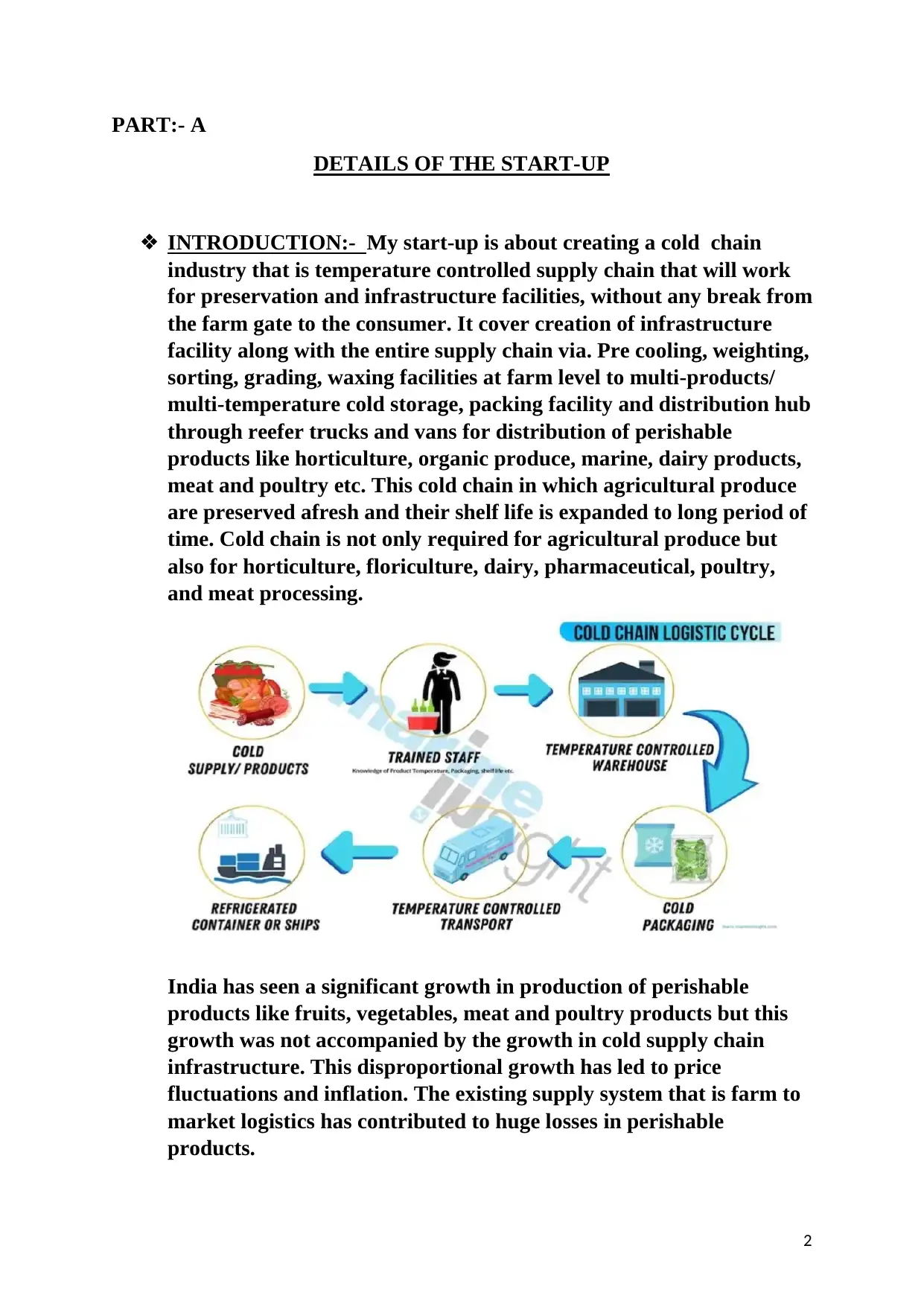
2
PART:- A
DETAILS OF THE START-UP
❖ INTRODUCTION:- My start-up is about creating a cold chain
industry that is temperature controlled supply chain that will work
for preservation and infrastructure facilities, without any break from
the farm gate to the consumer. It cover creation of infrastructure
facility along with the entire supply chain via. Pre cooling, weighting,
sorting, grading, waxing facilities at farm level to multi-products/
multi-temperature cold storage, packing facility and distribution hub
through reefer trucks and vans for distribution of perishable
products like horticulture, organic produce, marine, dairy products,
meat and poultry etc. This cold chain in which agricultural produce
are preserved afresh and their shelf life is expanded to long period of
time. Cold chain is not only required for agricultural produce but
also for horticulture, floriculture, dairy, pharmaceutical, poultry,
and meat processing.
India has seen a significant growth in production of perishable
products like fruits, vegetables, meat and poultry products but this
growth was not accompanied by the growth in cold supply chain
infrastructure. This disproportional growth has led to price
fluctuations and inflation. The existing supply system that is farm to
market logistics has contributed to huge losses in perishable
products.
PART:- A
DETAILS OF THE START-UP
❖ INTRODUCTION:- My start-up is about creating a cold chain
industry that is temperature controlled supply chain that will work
for preservation and infrastructure facilities, without any break from
the farm gate to the consumer. It cover creation of infrastructure
facility along with the entire supply chain via. Pre cooling, weighting,
sorting, grading, waxing facilities at farm level to multi-products/
multi-temperature cold storage, packing facility and distribution hub
through reefer trucks and vans for distribution of perishable
products like horticulture, organic produce, marine, dairy products,
meat and poultry etc. This cold chain in which agricultural produce
are preserved afresh and their shelf life is expanded to long period of
time. Cold chain is not only required for agricultural produce but
also for horticulture, floriculture, dairy, pharmaceutical, poultry,
and meat processing.
India has seen a significant growth in production of perishable
products like fruits, vegetables, meat and poultry products but this
growth was not accompanied by the growth in cold supply chain
infrastructure. This disproportional growth has led to price
fluctuations and inflation. The existing supply system that is farm to
market logistics has contributed to huge losses in perishable
products.
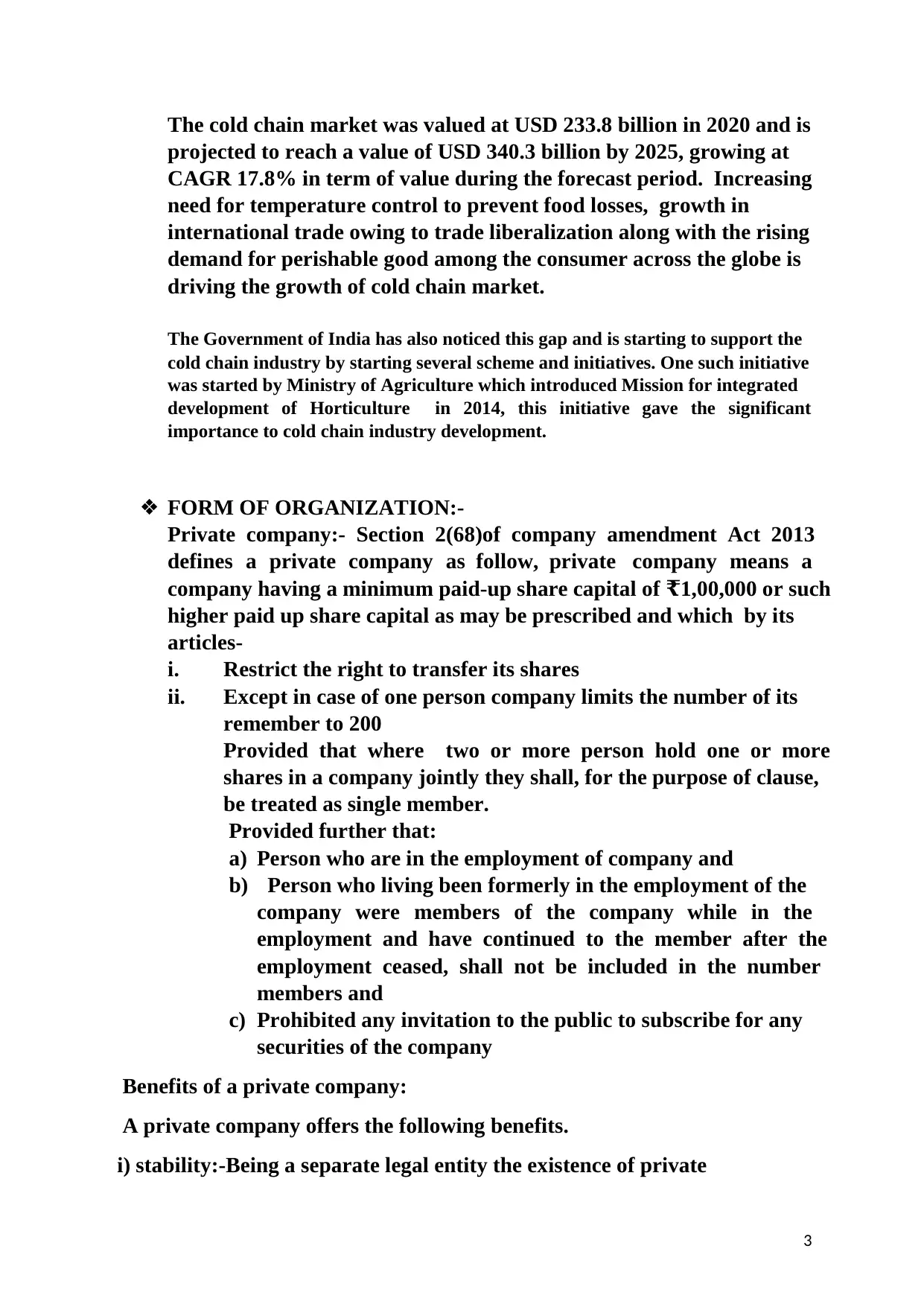
3
The cold chain market was valued at USD 233.8 billion in 2020 and is
projected to reach a value of USD 340.3 billion by 2025, growing at
CAGR 17.8% in term of value during the forecast period. Increasing
need for temperature control to prevent food losses, growth in
international trade owing to trade liberalization along with the rising
demand for perishable good among the consumer across the globe is
driving the growth of cold chain market.
The Government of India has also noticed this gap and is starting to support the
cold chain industry by starting several scheme and initiatives. One such initiative
was started by Ministry of Agriculture which introduced Mission for integrated
development of Horticulture in 2014, this initiative gave the significant
importance to cold chain industry development.
❖ FORM OF ORGANIZATION:-
Private company:- Section 2(68)of company amendment Act 2013
defines a private company as follow, private company means a
company having a minimum paid-up share capital of 1,00,000 or such₹
higher paid up share capital as may be prescribed and which by its
articles-
i. Restrict the right to transfer its shares
ii. Except in case of one person company limits the number of its
remember to 200
Provided that where two or more person hold one or more
shares in a company jointly they shall, for the purpose of clause,
be treated as single member.
Provided further that:
a) Person who are in the employment of company and
b) Person who living been formerly in the employment of the
company were members of the company while in the
employment and have continued to the member after the
employment ceased, shall not be included in the number
members and
c) Prohibited any invitation to the public to subscribe for any
securities of the company
Benefits of a private company:
A private company offers the following benefits.
i) stability:-Being a separate legal entity the existence of private
The cold chain market was valued at USD 233.8 billion in 2020 and is
projected to reach a value of USD 340.3 billion by 2025, growing at
CAGR 17.8% in term of value during the forecast period. Increasing
need for temperature control to prevent food losses, growth in
international trade owing to trade liberalization along with the rising
demand for perishable good among the consumer across the globe is
driving the growth of cold chain market.
The Government of India has also noticed this gap and is starting to support the
cold chain industry by starting several scheme and initiatives. One such initiative
was started by Ministry of Agriculture which introduced Mission for integrated
development of Horticulture in 2014, this initiative gave the significant
importance to cold chain industry development.
❖ FORM OF ORGANIZATION:-
Private company:- Section 2(68)of company amendment Act 2013
defines a private company as follow, private company means a
company having a minimum paid-up share capital of 1,00,000 or such₹
higher paid up share capital as may be prescribed and which by its
articles-
i. Restrict the right to transfer its shares
ii. Except in case of one person company limits the number of its
remember to 200
Provided that where two or more person hold one or more
shares in a company jointly they shall, for the purpose of clause,
be treated as single member.
Provided further that:
a) Person who are in the employment of company and
b) Person who living been formerly in the employment of the
company were members of the company while in the
employment and have continued to the member after the
employment ceased, shall not be included in the number
members and
c) Prohibited any invitation to the public to subscribe for any
securities of the company
Benefits of a private company:
A private company offers the following benefits.
i) stability:-Being a separate legal entity the existence of private
⊘ This is a preview!⊘
Do you want full access?
Subscribe today to unlock all pages.

Trusted by 1+ million students worldwide
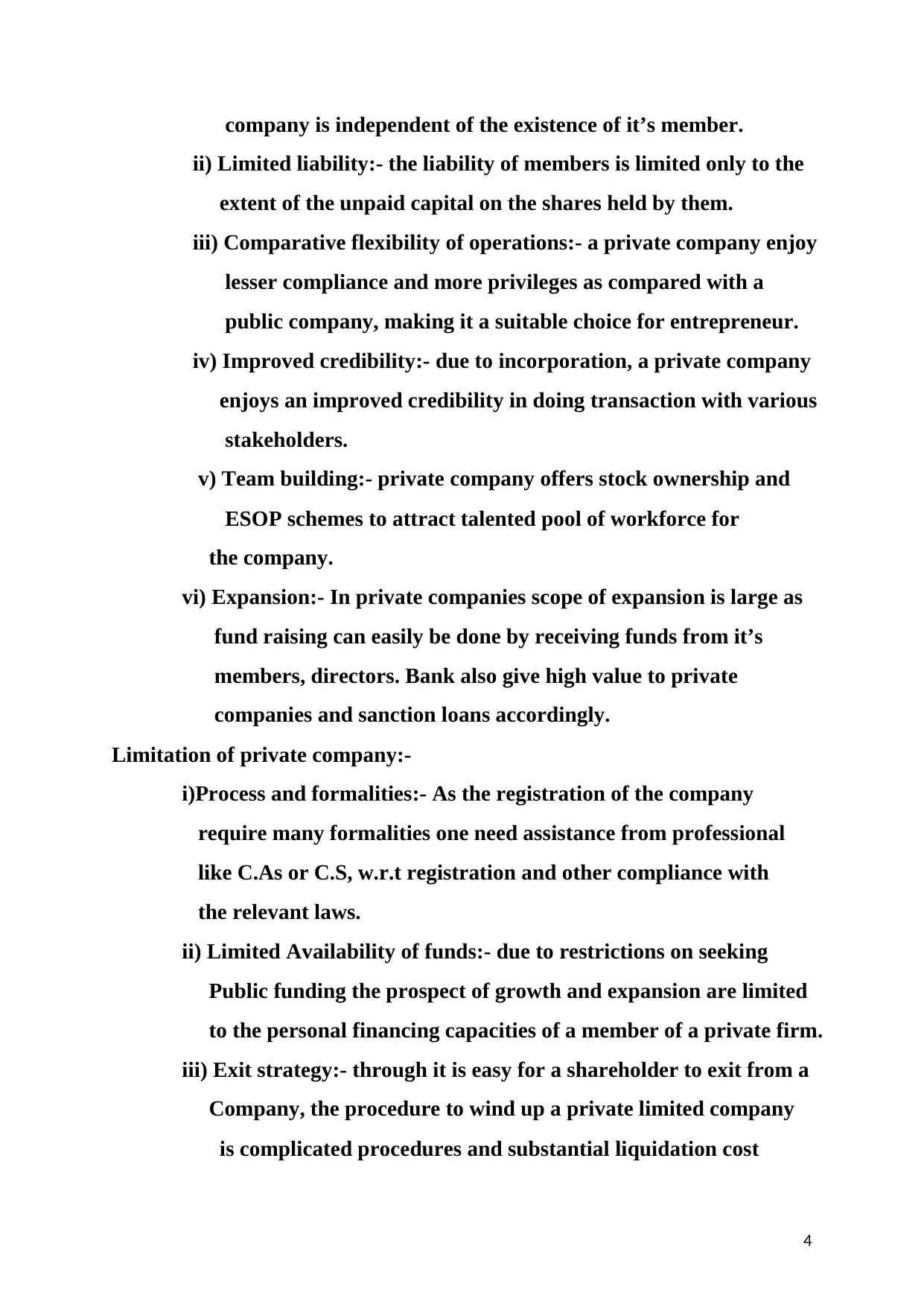
4
company is independent of the existence of it’s member.
ii) Limited liability:- the liability of members is limited only to the
extent of the unpaid capital on the shares held by them.
iii) Comparative flexibility of operations:- a private company enjoy
lesser compliance and more privileges as compared with a
public company, making it a suitable choice for entrepreneur.
iv) Improved credibility:- due to incorporation, a private company
enjoys an improved credibility in doing transaction with various
stakeholders.
v) Team building:- private company offers stock ownership and
ESOP schemes to attract talented pool of workforce for
the company.
vi) Expansion:- In private companies scope of expansion is large as
fund raising can easily be done by receiving funds from it’s
members, directors. Bank also give high value to private
companies and sanction loans accordingly.
Limitation of private company:-
i)Process and formalities:- As the registration of the company
require many formalities one need assistance from professional
like C.As or C.S, w.r.t registration and other compliance with
the relevant laws.
ii) Limited Availability of funds:- due to restrictions on seeking
Public funding the prospect of growth and expansion are limited
to the personal financing capacities of a member of a private firm.
iii) Exit strategy:- through it is easy for a shareholder to exit from a
Company, the procedure to wind up a private limited company
is complicated procedures and substantial liquidation cost
company is independent of the existence of it’s member.
ii) Limited liability:- the liability of members is limited only to the
extent of the unpaid capital on the shares held by them.
iii) Comparative flexibility of operations:- a private company enjoy
lesser compliance and more privileges as compared with a
public company, making it a suitable choice for entrepreneur.
iv) Improved credibility:- due to incorporation, a private company
enjoys an improved credibility in doing transaction with various
stakeholders.
v) Team building:- private company offers stock ownership and
ESOP schemes to attract talented pool of workforce for
the company.
vi) Expansion:- In private companies scope of expansion is large as
fund raising can easily be done by receiving funds from it’s
members, directors. Bank also give high value to private
companies and sanction loans accordingly.
Limitation of private company:-
i)Process and formalities:- As the registration of the company
require many formalities one need assistance from professional
like C.As or C.S, w.r.t registration and other compliance with
the relevant laws.
ii) Limited Availability of funds:- due to restrictions on seeking
Public funding the prospect of growth and expansion are limited
to the personal financing capacities of a member of a private firm.
iii) Exit strategy:- through it is easy for a shareholder to exit from a
Company, the procedure to wind up a private limited company
is complicated procedures and substantial liquidation cost
Paraphrase This Document
Need a fresh take? Get an instant paraphrase of this document with our AI Paraphraser
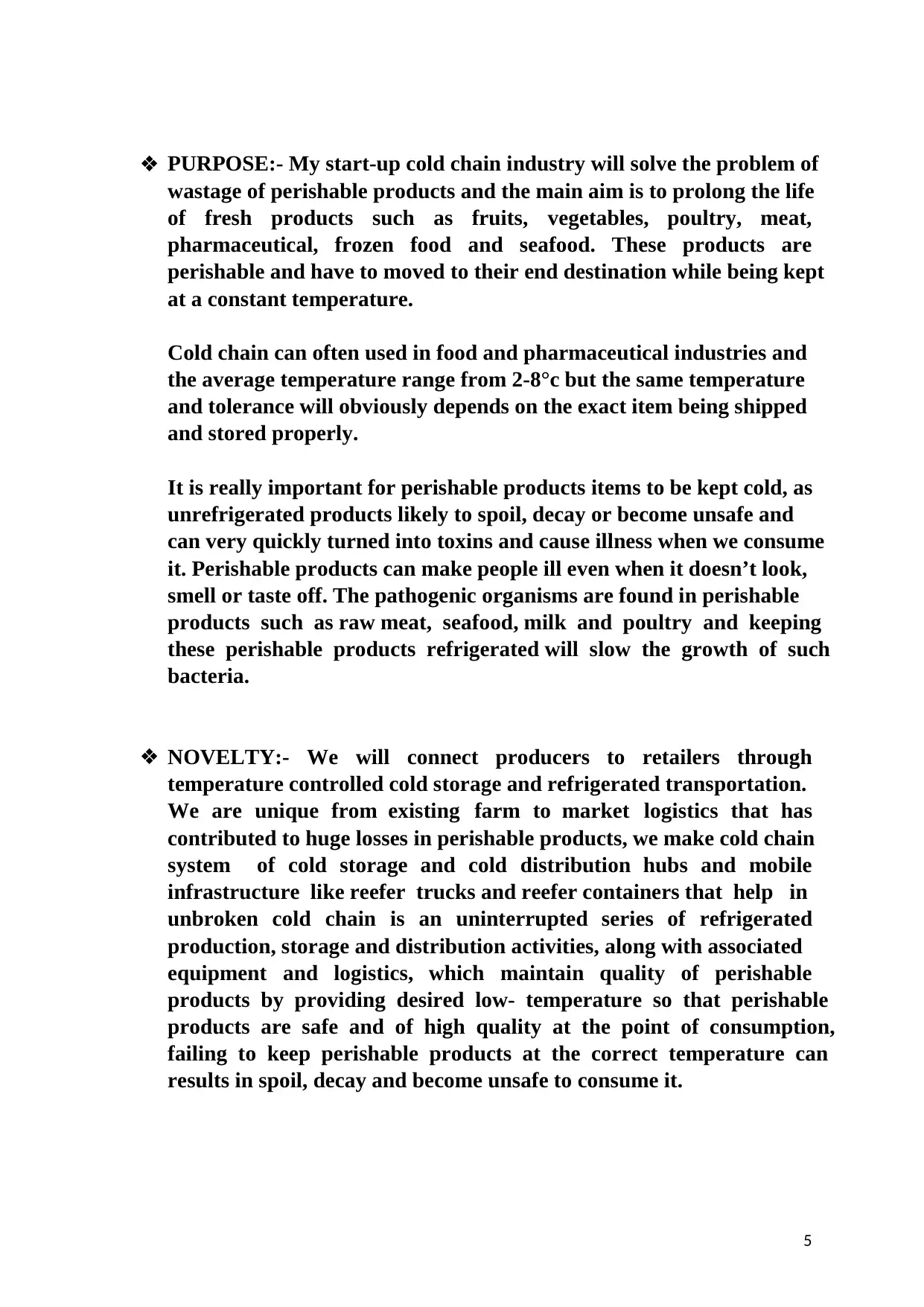
5
❖ PURPOSE:- My start-up cold chain industry will solve the problem of
wastage of perishable products and the main aim is to prolong the life
of fresh products such as fruits, vegetables, poultry, meat,
pharmaceutical, frozen food and seafood. These products are
perishable and have to moved to their end destination while being kept
at a constant temperature.
Cold chain can often used in food and pharmaceutical industries and
the average temperature range from 2-8°c but the same temperature
and tolerance will obviously depends on the exact item being shipped
and stored properly.
It is really important for perishable products items to be kept cold, as
unrefrigerated products likely to spoil, decay or become unsafe and
can very quickly turned into toxins and cause illness when we consume
it. Perishable products can make people ill even when it doesn’t look,
smell or taste off. The pathogenic organisms are found in perishable
products such as raw meat, seafood, milk and poultry and keeping
these perishable products refrigerated will slow the growth of such
bacteria.
❖ NOVELTY:- We will connect producers to retailers through
temperature controlled cold storage and refrigerated transportation.
We are unique from existing farm to market logistics that has
contributed to huge losses in perishable products, we make cold chain
system of cold storage and cold distribution hubs and mobile
infrastructure like reefer trucks and reefer containers that help in
unbroken cold chain is an uninterrupted series of refrigerated
production, storage and distribution activities, along with associated
equipment and logistics, which maintain quality of perishable
products by providing desired low- temperature so that perishable
products are safe and of high quality at the point of consumption,
failing to keep perishable products at the correct temperature can
results in spoil, decay and become unsafe to consume it.
❖ PURPOSE:- My start-up cold chain industry will solve the problem of
wastage of perishable products and the main aim is to prolong the life
of fresh products such as fruits, vegetables, poultry, meat,
pharmaceutical, frozen food and seafood. These products are
perishable and have to moved to their end destination while being kept
at a constant temperature.
Cold chain can often used in food and pharmaceutical industries and
the average temperature range from 2-8°c but the same temperature
and tolerance will obviously depends on the exact item being shipped
and stored properly.
It is really important for perishable products items to be kept cold, as
unrefrigerated products likely to spoil, decay or become unsafe and
can very quickly turned into toxins and cause illness when we consume
it. Perishable products can make people ill even when it doesn’t look,
smell or taste off. The pathogenic organisms are found in perishable
products such as raw meat, seafood, milk and poultry and keeping
these perishable products refrigerated will slow the growth of such
bacteria.
❖ NOVELTY:- We will connect producers to retailers through
temperature controlled cold storage and refrigerated transportation.
We are unique from existing farm to market logistics that has
contributed to huge losses in perishable products, we make cold chain
system of cold storage and cold distribution hubs and mobile
infrastructure like reefer trucks and reefer containers that help in
unbroken cold chain is an uninterrupted series of refrigerated
production, storage and distribution activities, along with associated
equipment and logistics, which maintain quality of perishable
products by providing desired low- temperature so that perishable
products are safe and of high quality at the point of consumption,
failing to keep perishable products at the correct temperature can
results in spoil, decay and become unsafe to consume it.
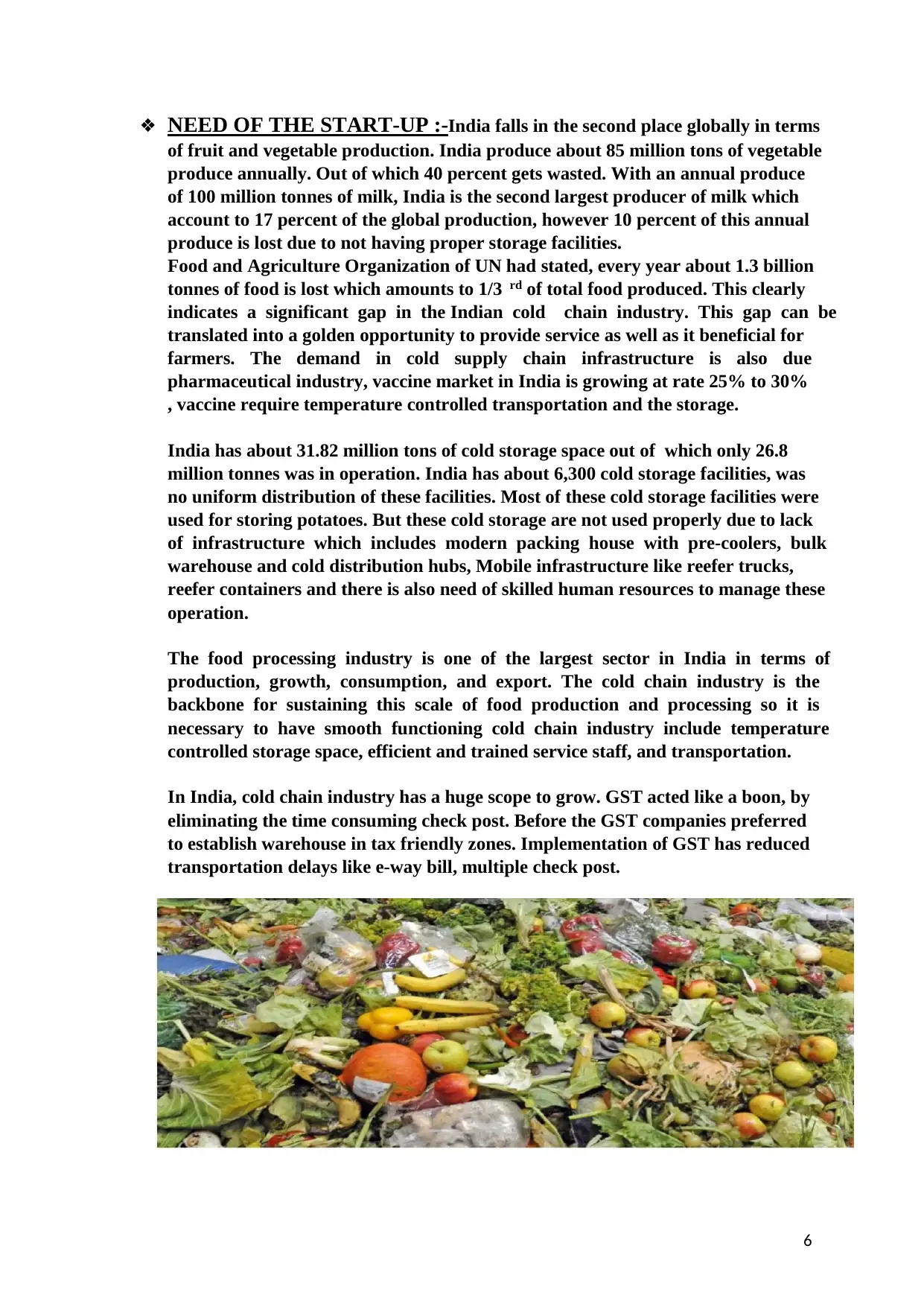
6
❖ NEED OF THE START-UP :-India falls in the second place globally in terms
of fruit and vegetable production. India produce about 85 million tons of vegetable
produce annually. Out of which 40 percent gets wasted. With an annual produce
of 100 million tonnes of milk, India is the second largest producer of milk which
account to 17 percent of the global production, however 10 percent of this annual
produce is lost due to not having proper storage facilities.
Food and Agriculture Organization of UN had stated, every year about 1.3 billion
tonnes of food is lost which amounts to 1/3 rd of total food produced. This clearly
indicates a significant gap in the Indian cold chain industry. This gap can be
translated into a golden opportunity to provide service as well as it beneficial for
farmers. The demand in cold supply chain infrastructure is also due
pharmaceutical industry, vaccine market in India is growing at rate 25% to 30%
, vaccine require temperature controlled transportation and the storage.
India has about 31.82 million tons of cold storage space out of which only 26.8
million tonnes was in operation. India has about 6,300 cold storage facilities, was
no uniform distribution of these facilities. Most of these cold storage facilities were
used for storing potatoes. But these cold storage are not used properly due to lack
of infrastructure which includes modern packing house with pre-coolers, bulk
warehouse and cold distribution hubs, Mobile infrastructure like reefer trucks,
reefer containers and there is also need of skilled human resources to manage these
operation.
The food processing industry is one of the largest sector in India in terms of
production, growth, consumption, and export. The cold chain industry is the
backbone for sustaining this scale of food production and processing so it is
necessary to have smooth functioning cold chain industry include temperature
controlled storage space, efficient and trained service staff, and transportation.
In India, cold chain industry has a huge scope to grow. GST acted like a boon, by
eliminating the time consuming check post. Before the GST companies preferred
to establish warehouse in tax friendly zones. Implementation of GST has reduced
transportation delays like e-way bill, multiple check post.
❖ NEED OF THE START-UP :-India falls in the second place globally in terms
of fruit and vegetable production. India produce about 85 million tons of vegetable
produce annually. Out of which 40 percent gets wasted. With an annual produce
of 100 million tonnes of milk, India is the second largest producer of milk which
account to 17 percent of the global production, however 10 percent of this annual
produce is lost due to not having proper storage facilities.
Food and Agriculture Organization of UN had stated, every year about 1.3 billion
tonnes of food is lost which amounts to 1/3 rd of total food produced. This clearly
indicates a significant gap in the Indian cold chain industry. This gap can be
translated into a golden opportunity to provide service as well as it beneficial for
farmers. The demand in cold supply chain infrastructure is also due
pharmaceutical industry, vaccine market in India is growing at rate 25% to 30%
, vaccine require temperature controlled transportation and the storage.
India has about 31.82 million tons of cold storage space out of which only 26.8
million tonnes was in operation. India has about 6,300 cold storage facilities, was
no uniform distribution of these facilities. Most of these cold storage facilities were
used for storing potatoes. But these cold storage are not used properly due to lack
of infrastructure which includes modern packing house with pre-coolers, bulk
warehouse and cold distribution hubs, Mobile infrastructure like reefer trucks,
reefer containers and there is also need of skilled human resources to manage these
operation.
The food processing industry is one of the largest sector in India in terms of
production, growth, consumption, and export. The cold chain industry is the
backbone for sustaining this scale of food production and processing so it is
necessary to have smooth functioning cold chain industry include temperature
controlled storage space, efficient and trained service staff, and transportation.
In India, cold chain industry has a huge scope to grow. GST acted like a boon, by
eliminating the time consuming check post. Before the GST companies preferred
to establish warehouse in tax friendly zones. Implementation of GST has reduced
transportation delays like e-way bill, multiple check post.
⊘ This is a preview!⊘
Do you want full access?
Subscribe today to unlock all pages.

Trusted by 1+ million students worldwide
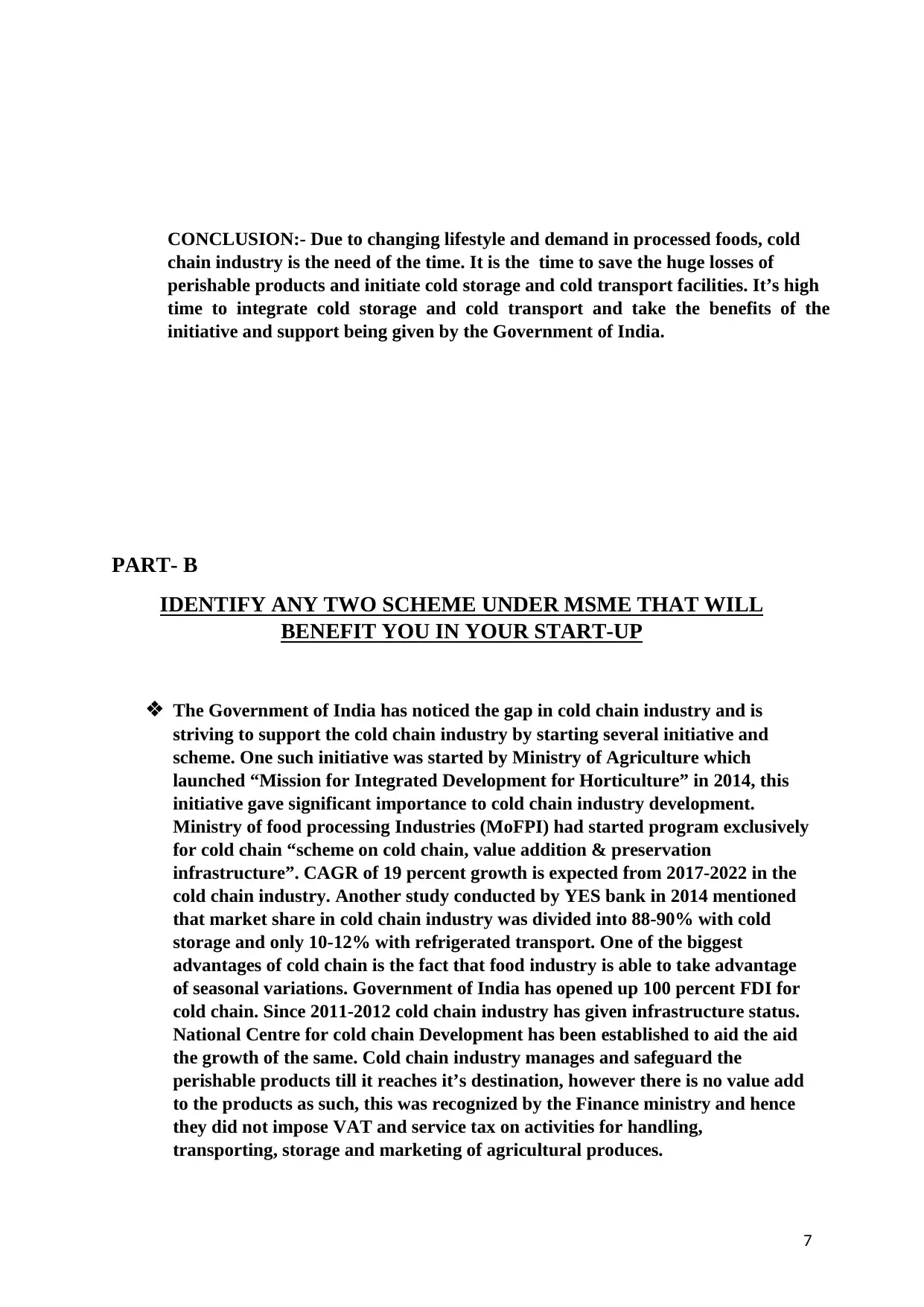
7
CONCLUSION:- Due to changing lifestyle and demand in processed foods, cold
chain industry is the need of the time. It is the time to save the huge losses of
perishable products and initiate cold storage and cold transport facilities. It’s high
time to integrate cold storage and cold transport and take the benefits of the
initiative and support being given by the Government of India.
PART- B
IDENTIFY ANY TWO SCHEME UNDER MSME THAT WILL
BENEFIT YOU IN YOUR START-UP
❖ The Government of India has noticed the gap in cold chain industry and is
striving to support the cold chain industry by starting several initiative and
scheme. One such initiative was started by Ministry of Agriculture which
launched “Mission for Integrated Development for Horticulture” in 2014, this
initiative gave significant importance to cold chain industry development.
Ministry of food processing Industries (MoFPI) had started program exclusively
for cold chain “scheme on cold chain, value addition & preservation
infrastructure”. CAGR of 19 percent growth is expected from 2017-2022 in the
cold chain industry. Another study conducted by YES bank in 2014 mentioned
that market share in cold chain industry was divided into 88-90% with cold
storage and only 10-12% with refrigerated transport. One of the biggest
advantages of cold chain is the fact that food industry is able to take advantage
of seasonal variations. Government of India has opened up 100 percent FDI for
cold chain. Since 2011-2012 cold chain industry has given infrastructure status.
National Centre for cold chain Development has been established to aid the aid
the growth of the same. Cold chain industry manages and safeguard the
perishable products till it reaches it’s destination, however there is no value add
to the products as such, this was recognized by the Finance ministry and hence
they did not impose VAT and service tax on activities for handling,
transporting, storage and marketing of agricultural produces.
CONCLUSION:- Due to changing lifestyle and demand in processed foods, cold
chain industry is the need of the time. It is the time to save the huge losses of
perishable products and initiate cold storage and cold transport facilities. It’s high
time to integrate cold storage and cold transport and take the benefits of the
initiative and support being given by the Government of India.
PART- B
IDENTIFY ANY TWO SCHEME UNDER MSME THAT WILL
BENEFIT YOU IN YOUR START-UP
❖ The Government of India has noticed the gap in cold chain industry and is
striving to support the cold chain industry by starting several initiative and
scheme. One such initiative was started by Ministry of Agriculture which
launched “Mission for Integrated Development for Horticulture” in 2014, this
initiative gave significant importance to cold chain industry development.
Ministry of food processing Industries (MoFPI) had started program exclusively
for cold chain “scheme on cold chain, value addition & preservation
infrastructure”. CAGR of 19 percent growth is expected from 2017-2022 in the
cold chain industry. Another study conducted by YES bank in 2014 mentioned
that market share in cold chain industry was divided into 88-90% with cold
storage and only 10-12% with refrigerated transport. One of the biggest
advantages of cold chain is the fact that food industry is able to take advantage
of seasonal variations. Government of India has opened up 100 percent FDI for
cold chain. Since 2011-2012 cold chain industry has given infrastructure status.
National Centre for cold chain Development has been established to aid the aid
the growth of the same. Cold chain industry manages and safeguard the
perishable products till it reaches it’s destination, however there is no value add
to the products as such, this was recognized by the Finance ministry and hence
they did not impose VAT and service tax on activities for handling,
transporting, storage and marketing of agricultural produces.
Paraphrase This Document
Need a fresh take? Get an instant paraphrase of this document with our AI Paraphraser
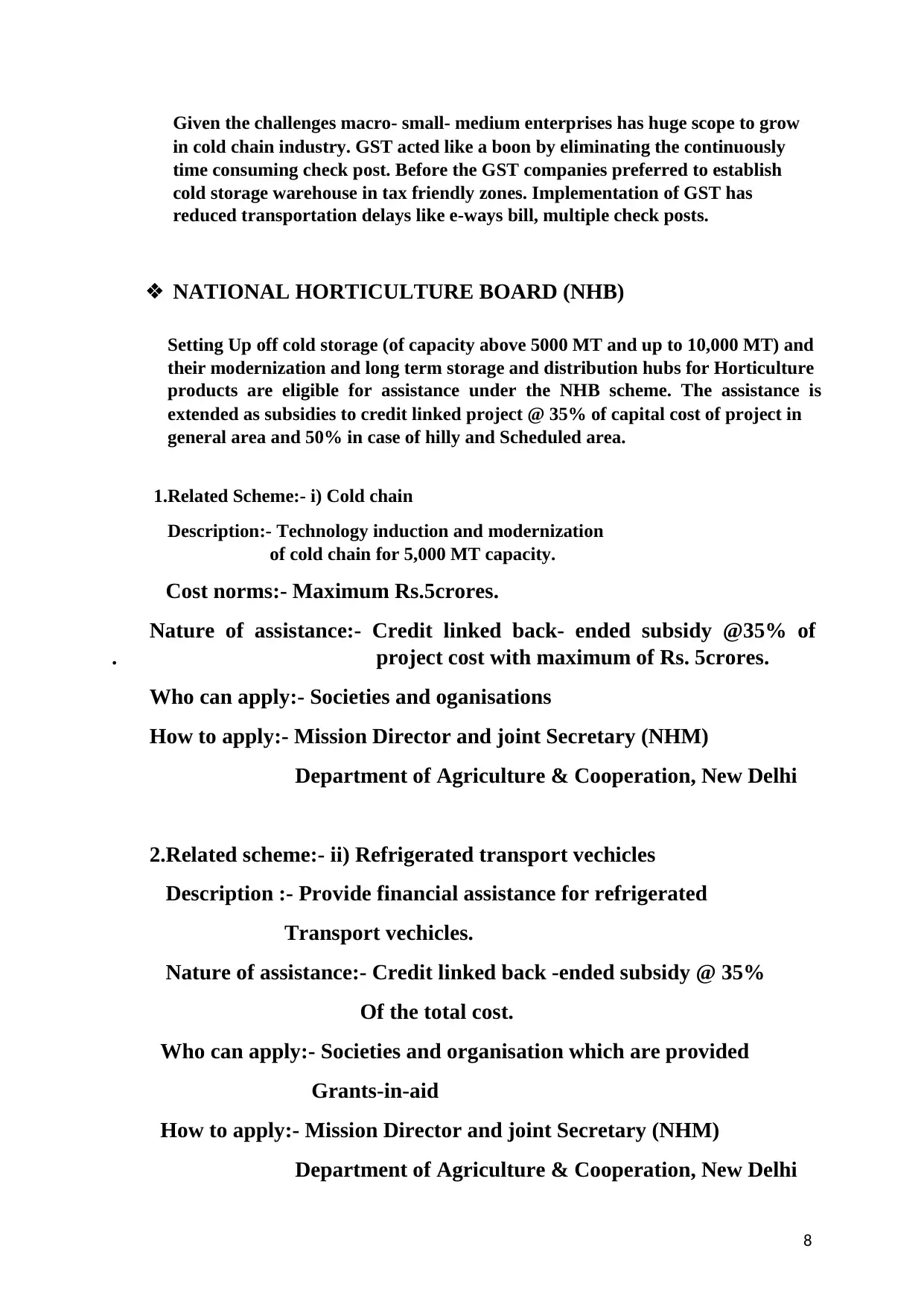
8
Given the challenges macro- small- medium enterprises has huge scope to grow
in cold chain industry. GST acted like a boon by eliminating the continuously
time consuming check post. Before the GST companies preferred to establish
cold storage warehouse in tax friendly zones. Implementation of GST has
reduced transportation delays like e-ways bill, multiple check posts.
❖ NATIONAL HORTICULTURE BOARD (NHB)
Setting Up off cold storage (of capacity above 5000 MT and up to 10,000 MT) and
their modernization and long term storage and distribution hubs for Horticulture
products are eligible for assistance under the NHB scheme. The assistance is
extended as subsidies to credit linked project @ 35% of capital cost of project in
general area and 50% in case of hilly and Scheduled area.
1.Related Scheme:- i) Cold chain
Description:- Technology induction and modernization
of cold chain for 5,000 MT capacity.
Cost norms:- Maximum Rs.5crores.
Nature of assistance:- Credit linked back- ended subsidy @35% of
. project cost with maximum of Rs. 5crores.
Who can apply:- Societies and oganisations
How to apply:- Mission Director and joint Secretary (NHM)
Department of Agriculture & Cooperation, New Delhi
2.Related scheme:- ii) Refrigerated transport vechicles
Description :- Provide financial assistance for refrigerated
Transport vechicles.
Nature of assistance:- Credit linked back -ended subsidy @ 35%
Of the total cost.
Who can apply:- Societies and organisation which are provided
Grants-in-aid
How to apply:- Mission Director and joint Secretary (NHM)
Department of Agriculture & Cooperation, New Delhi
Given the challenges macro- small- medium enterprises has huge scope to grow
in cold chain industry. GST acted like a boon by eliminating the continuously
time consuming check post. Before the GST companies preferred to establish
cold storage warehouse in tax friendly zones. Implementation of GST has
reduced transportation delays like e-ways bill, multiple check posts.
❖ NATIONAL HORTICULTURE BOARD (NHB)
Setting Up off cold storage (of capacity above 5000 MT and up to 10,000 MT) and
their modernization and long term storage and distribution hubs for Horticulture
products are eligible for assistance under the NHB scheme. The assistance is
extended as subsidies to credit linked project @ 35% of capital cost of project in
general area and 50% in case of hilly and Scheduled area.
1.Related Scheme:- i) Cold chain
Description:- Technology induction and modernization
of cold chain for 5,000 MT capacity.
Cost norms:- Maximum Rs.5crores.
Nature of assistance:- Credit linked back- ended subsidy @35% of
. project cost with maximum of Rs. 5crores.
Who can apply:- Societies and oganisations
How to apply:- Mission Director and joint Secretary (NHM)
Department of Agriculture & Cooperation, New Delhi
2.Related scheme:- ii) Refrigerated transport vechicles
Description :- Provide financial assistance for refrigerated
Transport vechicles.
Nature of assistance:- Credit linked back -ended subsidy @ 35%
Of the total cost.
Who can apply:- Societies and organisation which are provided
Grants-in-aid
How to apply:- Mission Director and joint Secretary (NHM)
Department of Agriculture & Cooperation, New Delhi
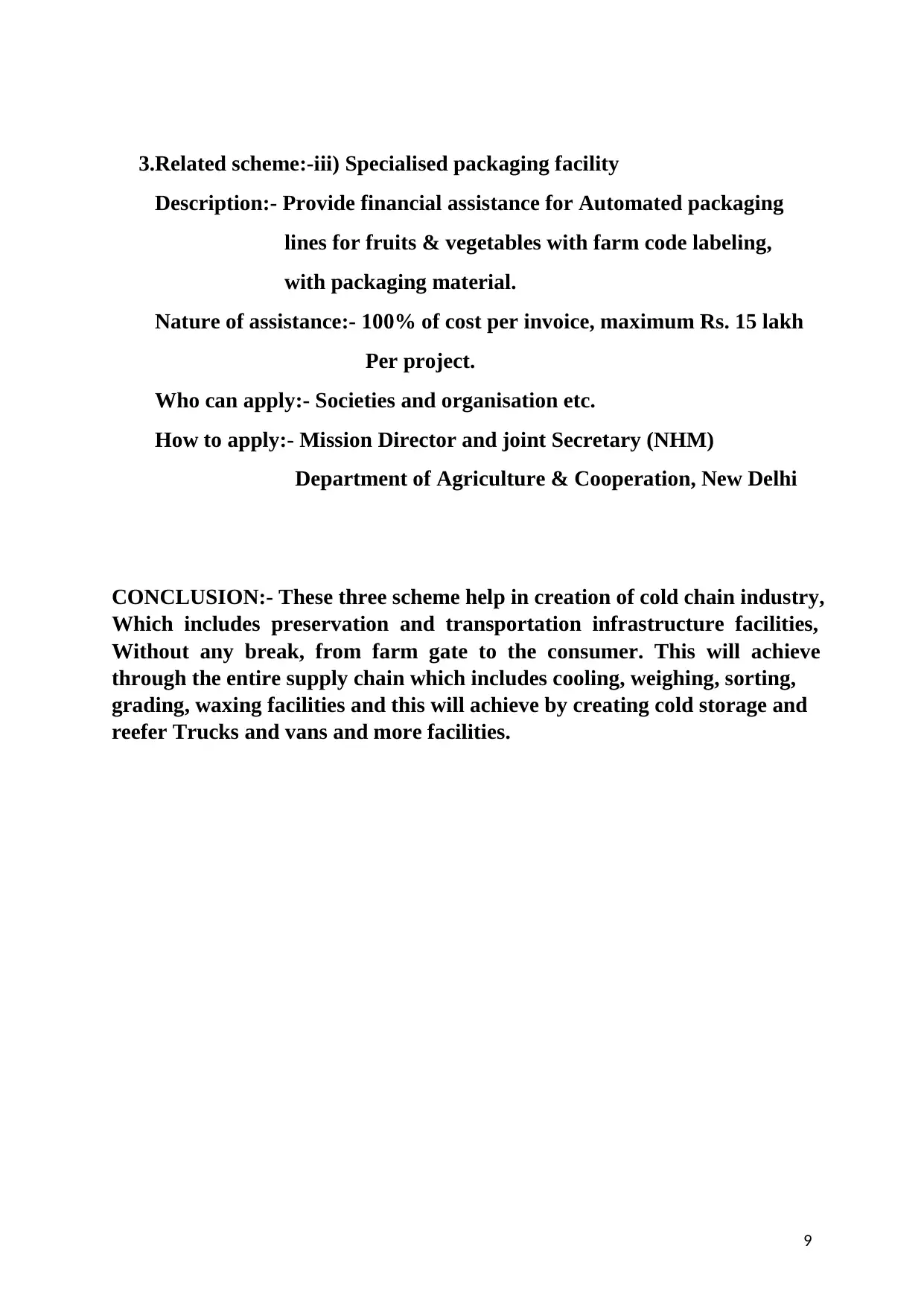
9
3.Related scheme:-iii) Specialised packaging facility
Description:- Provide financial assistance for Automated packaging
lines for fruits & vegetables with farm code labeling,
with packaging material.
Nature of assistance:- 100% of cost per invoice, maximum Rs. 15 lakh
Per project.
Who can apply:- Societies and organisation etc.
How to apply:- Mission Director and joint Secretary (NHM)
Department of Agriculture & Cooperation, New Delhi
CONCLUSION:- These three scheme help in creation of cold chain industry,
Which includes preservation and transportation infrastructure facilities,
Without any break, from farm gate to the consumer. This will achieve
through the entire supply chain which includes cooling, weighing, sorting,
grading, waxing facilities and this will achieve by creating cold storage and
reefer Trucks and vans and more facilities.
3.Related scheme:-iii) Specialised packaging facility
Description:- Provide financial assistance for Automated packaging
lines for fruits & vegetables with farm code labeling,
with packaging material.
Nature of assistance:- 100% of cost per invoice, maximum Rs. 15 lakh
Per project.
Who can apply:- Societies and organisation etc.
How to apply:- Mission Director and joint Secretary (NHM)
Department of Agriculture & Cooperation, New Delhi
CONCLUSION:- These three scheme help in creation of cold chain industry,
Which includes preservation and transportation infrastructure facilities,
Without any break, from farm gate to the consumer. This will achieve
through the entire supply chain which includes cooling, weighing, sorting,
grading, waxing facilities and this will achieve by creating cold storage and
reefer Trucks and vans and more facilities.
⊘ This is a preview!⊘
Do you want full access?
Subscribe today to unlock all pages.

Trusted by 1+ million students worldwide
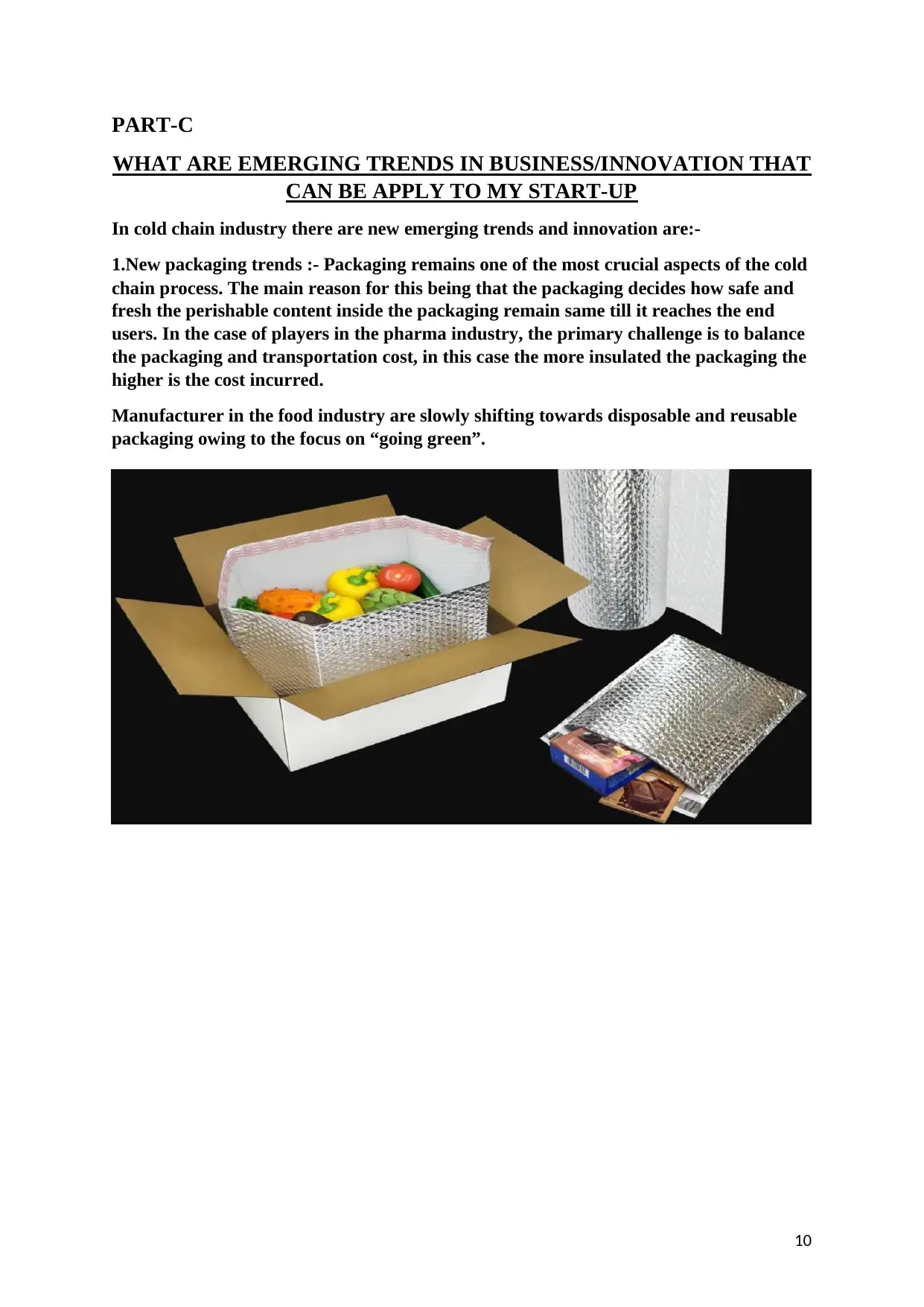
10
PART-C
WHAT ARE EMERGING TRENDS IN BUSINESS/INNOVATION THAT
CAN BE APPLY TO MY START-UP
In cold chain industry there are new emerging trends and innovation are:-
1.New packaging trends :- Packaging remains one of the most crucial aspects of the cold
chain process. The main reason for this being that the packaging decides how safe and
fresh the perishable content inside the packaging remain same till it reaches the end
users. In the case of players in the pharma industry, the primary challenge is to balance
the packaging and transportation cost, in this case the more insulated the packaging the
higher is the cost incurred.
Manufacturer in the food industry are slowly shifting towards disposable and reusable
packaging owing to the focus on “going green”.
PART-C
WHAT ARE EMERGING TRENDS IN BUSINESS/INNOVATION THAT
CAN BE APPLY TO MY START-UP
In cold chain industry there are new emerging trends and innovation are:-
1.New packaging trends :- Packaging remains one of the most crucial aspects of the cold
chain process. The main reason for this being that the packaging decides how safe and
fresh the perishable content inside the packaging remain same till it reaches the end
users. In the case of players in the pharma industry, the primary challenge is to balance
the packaging and transportation cost, in this case the more insulated the packaging the
higher is the cost incurred.
Manufacturer in the food industry are slowly shifting towards disposable and reusable
packaging owing to the focus on “going green”.
Paraphrase This Document
Need a fresh take? Get an instant paraphrase of this document with our AI Paraphraser
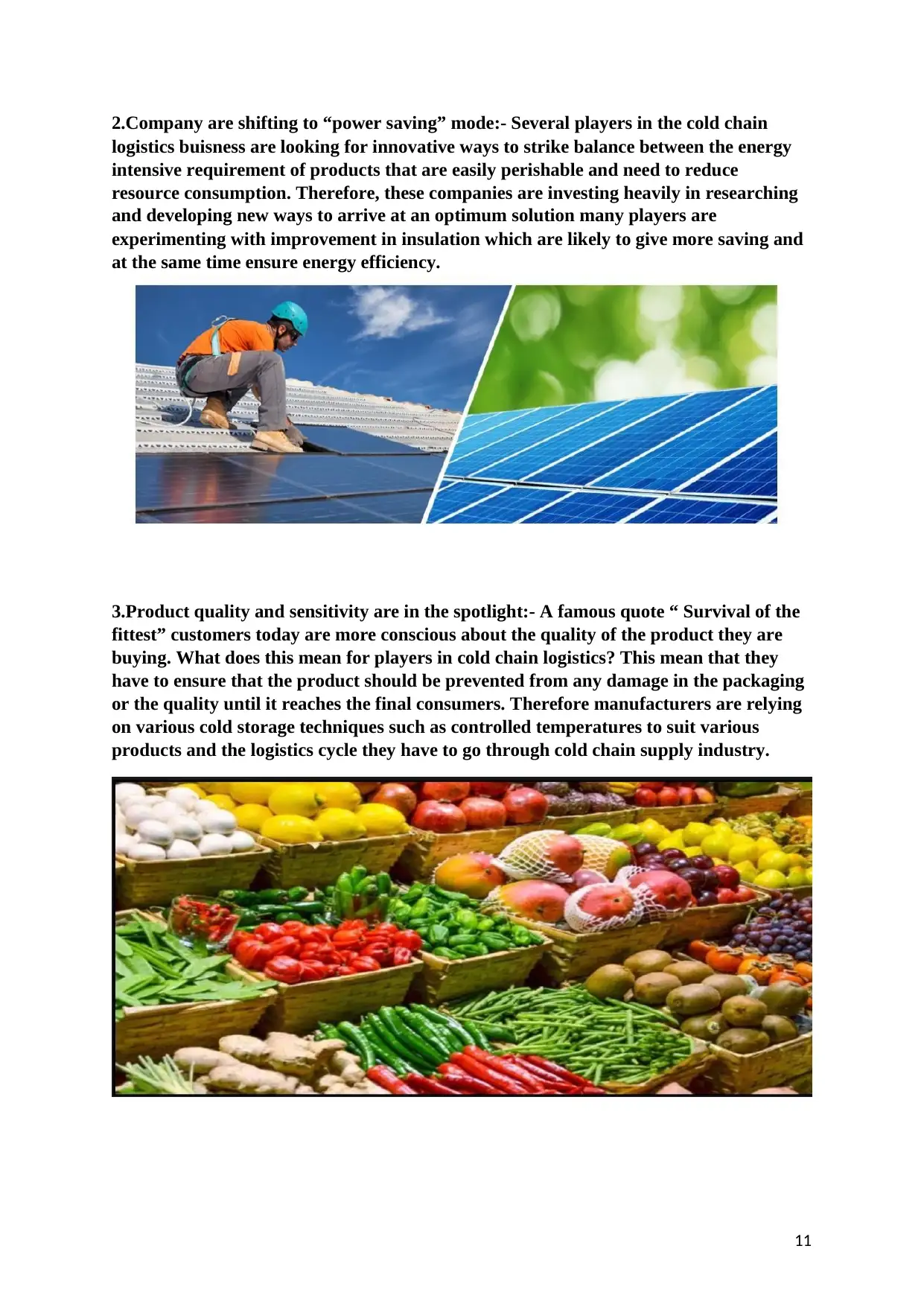
11
2.Company are shifting to “power saving” mode:- Several players in the cold chain
logistics buisness are looking for innovative ways to strike balance between the energy
intensive requirement of products that are easily perishable and need to reduce
resource consumption. Therefore, these companies are investing heavily in researching
and developing new ways to arrive at an optimum solution many players are
experimenting with improvement in insulation which are likely to give more saving and
at the same time ensure energy efficiency.
3.Product quality and sensitivity are in the spotlight:- A famous quote “ Survival of the
fittest” customers today are more conscious about the quality of the product they are
buying. What does this mean for players in cold chain logistics? This mean that they
have to ensure that the product should be prevented from any damage in the packaging
or the quality until it reaches the final consumers. Therefore manufacturers are relying
on various cold storage techniques such as controlled temperatures to suit various
products and the logistics cycle they have to go through cold chain supply industry.
2.Company are shifting to “power saving” mode:- Several players in the cold chain
logistics buisness are looking for innovative ways to strike balance between the energy
intensive requirement of products that are easily perishable and need to reduce
resource consumption. Therefore, these companies are investing heavily in researching
and developing new ways to arrive at an optimum solution many players are
experimenting with improvement in insulation which are likely to give more saving and
at the same time ensure energy efficiency.
3.Product quality and sensitivity are in the spotlight:- A famous quote “ Survival of the
fittest” customers today are more conscious about the quality of the product they are
buying. What does this mean for players in cold chain logistics? This mean that they
have to ensure that the product should be prevented from any damage in the packaging
or the quality until it reaches the final consumers. Therefore manufacturers are relying
on various cold storage techniques such as controlled temperatures to suit various
products and the logistics cycle they have to go through cold chain supply industry.

12
3.Real time data is driving ultra Responsive operation:- Intelligent assets are helping
retailers and suppliers ensure the quality of fresh foods in transit by making it easier to
maintain unbroken temperature control. For instance, a growing number of
refrigerated cargo containers can be remotely monitored and controlled using IoT
(internet of things) device and cloud- based software applications. Beyond standard
refrigeration equipment, smart reefer containers can use ozone generating units,
venting valves and other measures to create optimal conditions for perishable products.
These acclimatizing systems are linked to sensors and transmitters on the reefer that
connect with the online management application, sharing data such as temperature and
CO2 reading, or if light is entering the container.
Instantly knowing a containers current state can avoid problems such as shipment of
lettuce left to wilt in the sun. As the temperature rises, an alert is triggered in the
system. The reefer owner can then resolve the matter with a call to the loading dock
rather than arguing about reimbursement after the fact. Additionally, the container
may use automated means to maintain temperature and atmosphere to strict
parameters, sending it’s location and status to the cloud every few minutes. For those
tasked with managing supply and minimizing loss, it’s just one way that greater
visibility into the cold chain is driving few efficiencies.
4.Blockchain Meets Cold Chain:- Blockchain is poised to transform the food industry,
says food logistics, but what is it exactly? Essentially, a blockchain is a permanent,
ordered, digital history of transactions that cannot be modified or deleted without the
consensus of others on the network (authorized parties able to tap the blockchain). This
is unchangeable record keeping solution is the same public ledger technology used to
verify cryptocurrency exchanges namely Bitcoin.
Food logistics paints the picture of a company that manages the ripening process for
produce and connect to cold storage, transporters and buyers with the goal of providing
3.Real time data is driving ultra Responsive operation:- Intelligent assets are helping
retailers and suppliers ensure the quality of fresh foods in transit by making it easier to
maintain unbroken temperature control. For instance, a growing number of
refrigerated cargo containers can be remotely monitored and controlled using IoT
(internet of things) device and cloud- based software applications. Beyond standard
refrigeration equipment, smart reefer containers can use ozone generating units,
venting valves and other measures to create optimal conditions for perishable products.
These acclimatizing systems are linked to sensors and transmitters on the reefer that
connect with the online management application, sharing data such as temperature and
CO2 reading, or if light is entering the container.
Instantly knowing a containers current state can avoid problems such as shipment of
lettuce left to wilt in the sun. As the temperature rises, an alert is triggered in the
system. The reefer owner can then resolve the matter with a call to the loading dock
rather than arguing about reimbursement after the fact. Additionally, the container
may use automated means to maintain temperature and atmosphere to strict
parameters, sending it’s location and status to the cloud every few minutes. For those
tasked with managing supply and minimizing loss, it’s just one way that greater
visibility into the cold chain is driving few efficiencies.
4.Blockchain Meets Cold Chain:- Blockchain is poised to transform the food industry,
says food logistics, but what is it exactly? Essentially, a blockchain is a permanent,
ordered, digital history of transactions that cannot be modified or deleted without the
consensus of others on the network (authorized parties able to tap the blockchain). This
is unchangeable record keeping solution is the same public ledger technology used to
verify cryptocurrency exchanges namely Bitcoin.
Food logistics paints the picture of a company that manages the ripening process for
produce and connect to cold storage, transporters and buyers with the goal of providing
⊘ This is a preview!⊘
Do you want full access?
Subscribe today to unlock all pages.

Trusted by 1+ million students worldwide
1 out of 19
Your All-in-One AI-Powered Toolkit for Academic Success.
+13062052269
info@desklib.com
Available 24*7 on WhatsApp / Email
![[object Object]](/_next/static/media/star-bottom.7253800d.svg)
Unlock your academic potential
Copyright © 2020–2026 A2Z Services. All Rights Reserved. Developed and managed by ZUCOL.